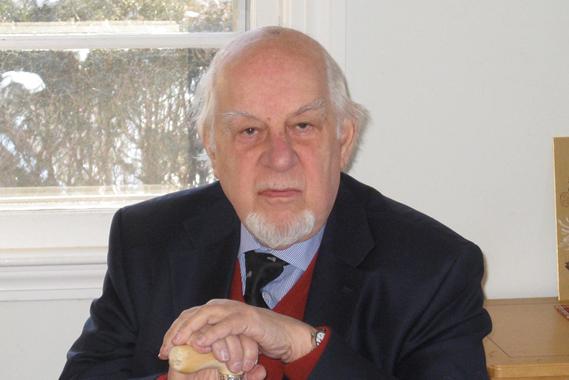Arthur Boyars, gifted poet and publisher with a passion for music
An associate of Oxford’s ‘angry young men’, he later returned to poetry after a 30-year hiatus

The poet, translator and publisher Arthur Boyars liked to say that he was born on the same day as Dietrich Fischer-Dieskau, 28 May, 1925, and was also a baritone. Boyars was from a Russian-Jewish family: his father was a cantor; his mother was an accomplished pianist. Boyars was educated at University College School and Wadham College, Oxford.
For a man who habitually lamented his loss of memory, Boyars knew and could recall much more than most, into his nineties. He was a linguist, reading and speaking French, German, Italian and Spanish. He was a walking encyclopedia, and a meticulous supplier of footnotes to cultural history. He knew that the Italian bass Nicola Rossi-Lemeni was the conductor Tullio Serafin’s son-in-law, that the British publisher John Holroyd-Reece founded Albatross Books, which influenced the naming of Allen Lane’s Penguin, and also translated the first biography of Van Gogh, from the German of Julius Meier-Graefe.
He had a vast knowledge of, and an inexhaustible appetite for music, and at concerts would do a little private conducting, and make gestures of assent. He never forgot the Koechel number of any Mozart work or the key of practically any work by Beethoven, Schubert, Brahms, etc. Of the myriad CDs precariously piled, making treacherous labyrinthine pathways in his living-room, his beloved favourite was a recording of André Tchaikovsky playing Schubert Ländler and dances.
Boyars knew which publisher had taken over which publishing house from the year dot, and who had slept with whom at almost any time. He was loveably self-absorbed, and never minded being interrupted. Boyars was as interested in others as in himself. He frequently gave the impression that he was having a miserable time, but was enlivening company and culturally insatiable. He enjoyed good food, but had often lost his judgement of where to eat it, regarding anywhere he’d been before as estimable, whereas it had often declined, or become enormously expensive. Boyars didn’t notice because he was talking, enjoying the ambience, and guffawing at your jokes and his own.
Boyars had done almost everything in the world of literature, music journalism and advertising. He was the last survivor of the group at Oxford that included Kenneth Tynan, John Wain and Kingsley Amis. He was certainly one of the last survivors, with its editor AL Alvarez, of the early Sixties Penguin anthology, The New Poetry.
In the Forties, he had – when still an undergraduate – contributed to and become co-editor of the poetry magazine Mandrake, founded in 1945 by John Wain. Boyars led it in an international direction, and Mandrake was an early publisher of Michael Hamburger, as well as of Mario Praz and the Italian poets, Quasimodo and Montale. Subsequently, Boyars was the advertising manager of Early Music and spent years as a kind of Leopold Bloom of the London musical and literary world, selling or buying space in theatre and opera programmes, and in various journals, from the Royal Opera House to New Left Review.
Boyars published his first volume of poetry in 1944 and wrote intermittently and experimentally into the Seventies. His poetry and particularly his criticism appeared in numerous places, from The Adelphi to PN Review; his translations (with Simon Franklin) of the Russian poet Yevgeny Yevtushenko, with whom he worked personally, appeared in Penguin in 1979. There was then a gap of 30 years until, in 2003, he began to write – or as he insisted, to copy down in dictation form – poems of great lucidity.
In 2011, with enormous assistance from his US-based artist-writer step-daughter Susan Quateman – who he visited for two to three months every year following the death of his wife – and an old friend, Scott-Martin Kosofsky of Philidor Press, Boyars published in the US a limited edition of Dictations: Selected Poems 1940–2009, which the critic Alberto Manguel praised as “Dantesque”.
Arthur Boyars married Marion Lobbenberg, a publisher in Hamburg and New York from the family of Asmus. She ran Calder & Boyars with John Calder; and then her own imprint with her husband as literary guide and cheerleader. Marion Boyars Publishers built up a distinguished international list, including Canetti, Bataille, Ivan Illich, Kenzaburo Oe, and others.
Marion died in 1999, leaving Boyars bereft. However, he was able to watch proudly over his stepdaughter Catheryn Kilgarriff’s astute continuation of the company that he and Marion had so successfully nurtured. He is survived by his two stepdaughter and four grandchildren.
Arthur Boyars, poet and publisher, born 28 May 1925, died 6 August 2017
Join our commenting forum
Join thought-provoking conversations, follow other Independent readers and see their replies
Comments
Bookmark popover
Removed from bookmarks